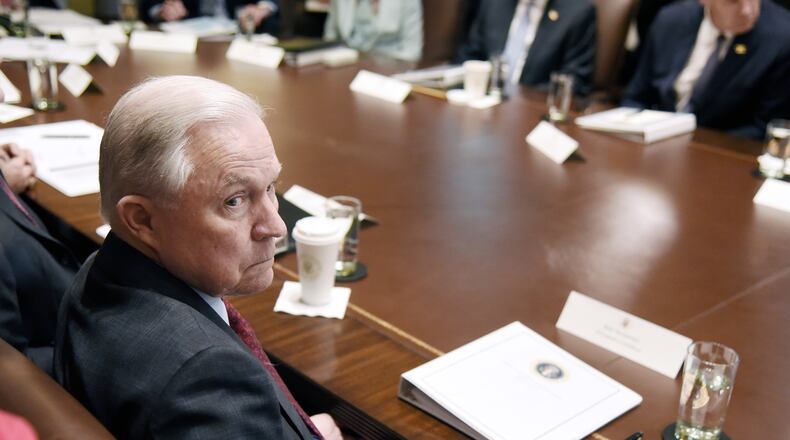As mentioned late last week, U.S. Attorney General Jeff Sessions on Sunday addressed the state's prosecuting attorneys, who were gathered for their annual convention.
He was not a cheerleader for the criminal justice reform that has been one of the hallmarks of Nathan Deal’s tenure as governor.
According to his prepared remarks, released afterwards, Sessions spoke of a spike in violent crime that occurred between 2014 and 2016:
"The violent crime rate went up by nearly seven percent. Robberies went up. Assaults went up nearly 10 percent. Rape went up by nearly 11 percent. Murder shot up by more than 20 percent!
"Here in the Peach State, violent crime went up nearly eight percent. Aggravated assault went up nearly twelve percent. Murder went up 17 percent."
The GBI would say that Sessions' figures are slightly off. In 2016, violent crime in Georgia was up 5 percent over 2014, murder was up 15 percent, and aggravated assault was up 8 percent.
We don’t know why the attorney general didn’t also include stats from 2017, the year he took office. Because at least in Georgia, the trend has continued. Violent crime as a whole is down a tick (1 percent) from 2014. But murder is up 21 percent over the same year, and aggravated assault is up 8 percent.
All that said, the thrust of Session’s message was that emptying state prisons is dangerous. The attorney didn’t mention Governor Deal by name, but appeared to be making an argument against reforms that Deal has led over the past seven years. Said Sessions:
"Two months ago, the Department of Justice's Bureau of Justice Statistics released a report on the recidivism rate of inmates released from state prisons in 30 states.
"This is the longest-term study that BJS has ever done on recidivism and perhaps the largest. It was designed and started by the previous administration. The results are clear and very important – historic importance. The reality confirms what experienced professionals like yourselves have seen.
"The study found that 83 percent of 60,000 state prisoners released in 2005 were arrested again within nine years. That's five out of every six.
"The study shows that two-thirds of those – a full 68 percent – were arrested within the first three years. Almost half were arrested within a year – one year – of being released.
"The study estimates that the 400,000 state prisoners released in 2005 were arrested nearly 2 million times during the nine-year period – an average of five arrests each."
Sessions said he wasn’t talking about “mindless” mass incarceration, but he did say this: “Recidivism is no little matter. It is a fact of life that must be understood.”
We haven't reached out to Governor Deal yet, but he might argue that this is why you should try to avoid sending first-time, non-violent offenders to state prisons in the first place – and why more attention should be paid to the re-entry of inmates into general society once they're released.
***
Yeah, this is the video of state Rep. Jason Spencer, R-Woodbine, that everyone is talking about.
***
Oh, the irony. It wasn't lost on Georgia politicos that days after President Donald Trump snubbed Casey Cagle, whose campaign was wracked by a secret recording, he had his own run-in with covert audio.
The president wrote on Twitter Saturday that it was “inconceivable” that his personal lawyer Michael Cohen would tape a client. “Totally unheard of & perhaps illegal,” he wrote. “The good news is that your favorite President did nothing wrong!"
Like Georgia, New York is a "one-party" consent state, meaning it only requires one participant in the conversation to record the audio.
***
Georgia operatives weren't the only ones surprised by President Trump's Brian Kemp endorsement last week. The New York Times reports that the commander-in-chief's Twitter testimonial on behalf of the secretary of state also had a ripple effect among other Republican governors, who worried that Trump's involvement could imperil favored GOP candidates in party primaries and statehouse races:
"Privately, the governors and their allies, some of whom are gathered here in the New Mexico capital for the annual summer meeting of the National Governors Association, expressed even more irritation about the president's endorsement in Georgia.
They are frustrated on several fronts: because Mr. Trump's out-of-the-blue tweet in support of Mr. Kemp was only the latest example of him intervening in races with no warning to the party infrastructure; because he continues to side with candidates they fear could prove weaker in the general election; and because Mr. Trump had assured Republican governors in private this year, at the last meeting of the National Governors Association, that he would refrain from involving himself in contested primaries, according to an official present for the conversation."
***
We're told that the Republican Governors Association has just bought up a week's worth of heavy TV airtime in the aftermath of tomorrow's results.
***
Because many of you have been asking: A wake for Tom Crawford, the dean of political reporters at the state Capitol, has been scheduled for 6 p.m. Tuesday, July 31, at Manuel's Tavern. If you'd be willing to say a few words about Crawford, who died last week after a long battle with melanoma, please drop a line to jgalloway@ajc.com.
***
We told you Friday about Steve Foster, U.S. Rep. Tom Graves' colorful Democratic challenger who's opted to represent himself in a drunken driving case. Newsweek has since caught up with Foster in a memorable interview that includes the former doctor discussing his desire for multiple blood tests to prove his sobriety, getting roughed up by neo-Nazis and a handful of correction officers and how English tonic in particular helps soothe his malaria symptoms. We can't make this stuff up, folks.
***
Never miss a minute of what's happening in Georgia Politics. Subscribe to PoliticallyGeorgia.com
The Latest
Featured






